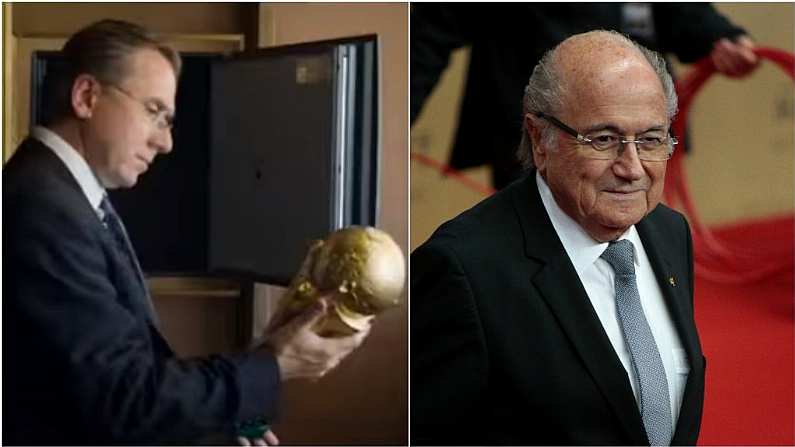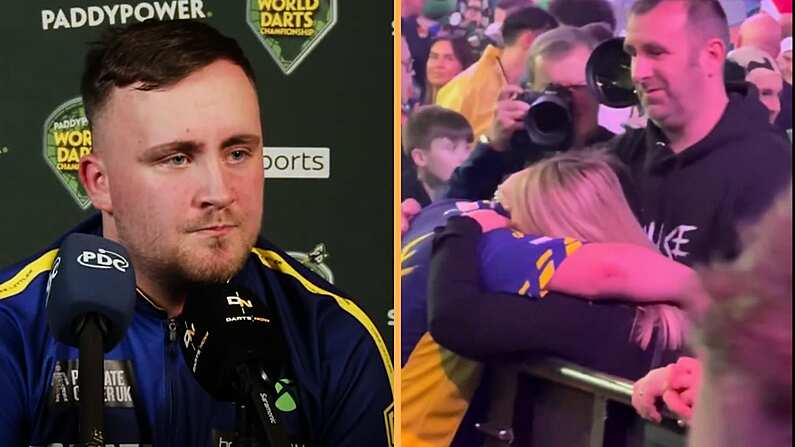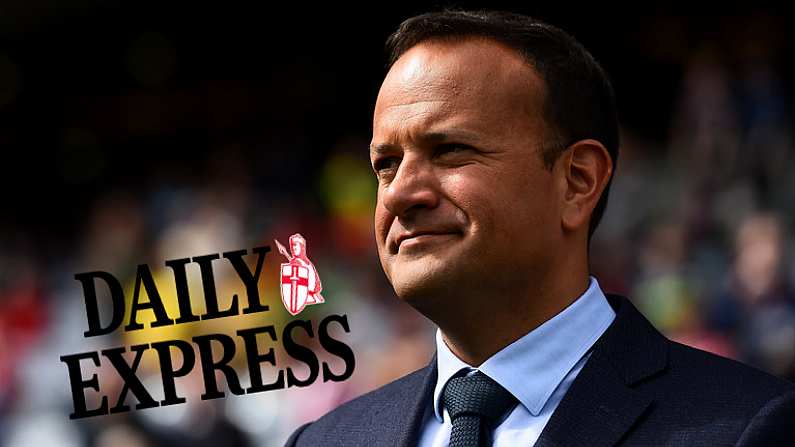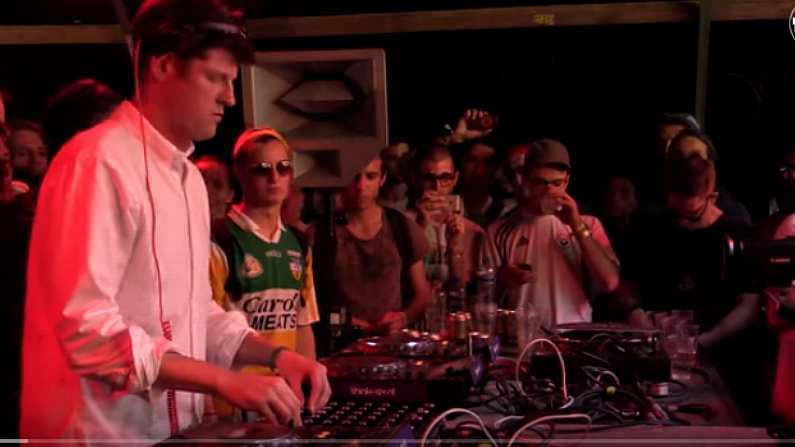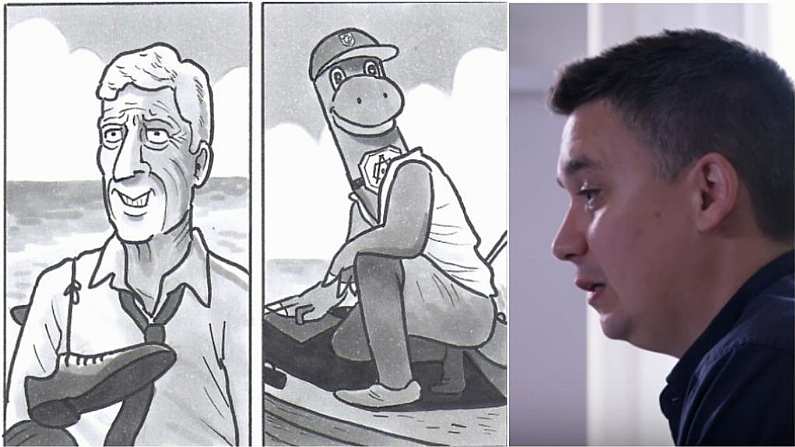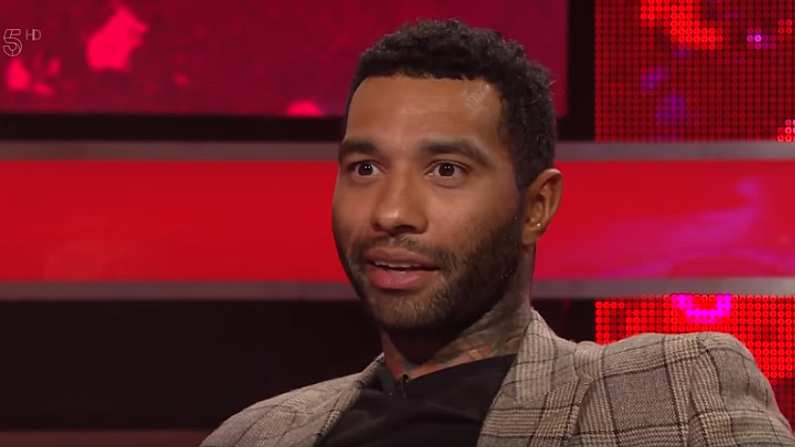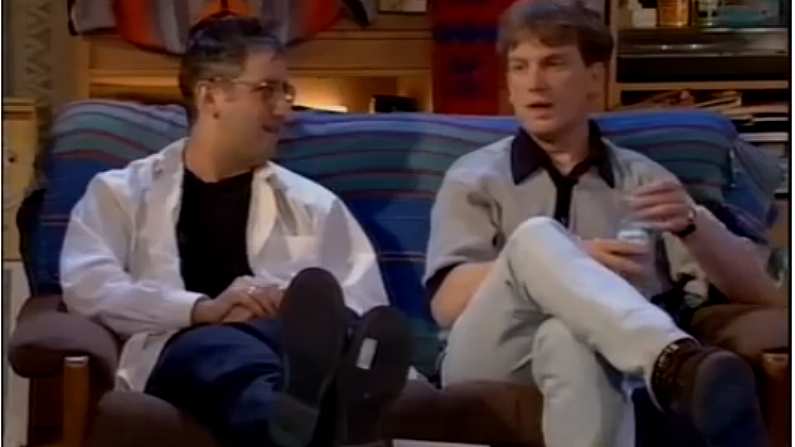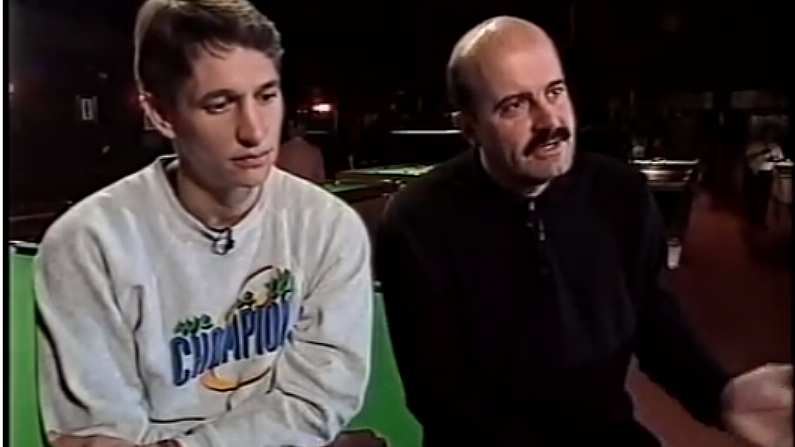You may, in ignominious times, have stumbled across the movie United Passions. We say movie - it's less that than an absurd stab at propaganda wanked out by the now-deposed Sepp Blatter. It's glamorous, crass and extravagantly dull - as you might expect from a movie about sports administration that deliberately evades all of the interesting things (corruption).
The movie was covered in the third episode of The Reducer, the podcast in which Balls' Gavin Cooney and ketamine-based Twitter threads' Seamas O'Reilly take a smug, self-satisfied scalpel to football and related culture in spite of no evidence they could make anything much better. You can subscribe to the podcast on iTunes or wherever you get your podcasts.
Delightfully, United Passions is the least successful movie in the history of the U.S. box office. It grossed, eh, $918 dollars on its opening weekend in the U.S., which just so happened to coincide with the FBI indicting ten FIFA officials on corruption charges. (One cinema in Phoenix, Arizona took $9, meaning one person went to see it).
Even for an organisation as talented as FIFA at making money disappear, this was quite the achievement. It lost around $26.8 million, but happily this was mostly FIFA's money: they financed 90% of the movie. (An aside - they toyed with the titles MEN OF LEGEND and THE DREAMMAKERS before settling on the stultifyingly dull name they went with).
A stunningly disinterested Tim Roth plays Sepp Blatter, with his hair slicked back so as to allow more room on which to staple his cheque. The director, Frederic Auburtin, said that he wanted to make a film that combined "a Disney propaganda film [with] a Costa-Gavras/Michael Moore movie", but his best-laid plans went awry. "Now I'm seen as bad as the guy who brought AIDS to Africa or the guy who caused the financial crisis", lamented Monsieur Auburtin. "My name is all over it and apparently I am a propaganda guy making films for corrupt people".
Roth, for his part, had the decency to refuse to do any interviews to promote the festering pile of shite, but did admit later in a Reddit AMA that he did it to put his daughter through college, saying that "this is a role that will have my father turning in his grave".
Some other asides from this movie before we get into exactly how it came to exist.
The movie charts FIFA's formation and rise as the progenitors of the World Cup, and includes a lot of maudlin inaccuracies of how the World Cup helped to bring the world together. In the attempt to portray FIFA as a force for good, the script needed an adversary. The English are picked out as the baddies, and are made preposterously racist. "Blasted frogs!" spits Lord Kinnard, the FA president at a French man, while he literally wears a monocle. Later, Jules Rimet - played by Gerard Depardieu - is confronted with a gurning Englishman who smugly says "Negroes, playing football, ha-ha! Why not women? That would be very amusing, hmm?". Eventually, FIFA is formed around a table, with the first line to be recorded in the minutes reading "We knock those English on their British asses".
From there, Rimet/Depardieu is idolised and sends long, excruciating minutes gazing into the distance wondering how FIFA can be a force for good. He eventually dies and is replaced by Joao Havalenge, played by Sam Neill. Havalenge's most memorable contribution is a problematic scene in which he hints to his right-hand man Sepp that he may indeed, after all, be God. (The script doesn't interrogate this a whole lot further).
The real deity is, of course, Blatter, and the movie then goes about charting his rise to the top of the governing body. This is done by striking business deals with Adidas and Coca-Cola, and is as dull as you'd expect the 'rich-men-getting-richer-in-the-vaguest-way-possible-so-as-to-avoid-accidentally-incriminating-themselves-in-a-simultaneous-investigation-running-in-the-real-world'.
The movie doesn't entirely shirk issues of corruption - they had to include mentions of some dodgy stuff so as to make the trailer misleading.
References to corruption, however, are hilariously vague and kept fully separate from Blatter's hinterland. This culminates in a scene which becomes a kind of paragon of nothingness, as Blatter faces questions of embezzlement and corruption from a supposedly-English journalist called Russel Wilcox. (We say supposedly-English - he has a distinctly Irish accent).
This was a peculiar film in the sense that I went to Geneva, and Sepp Blatter turned up. It was a like a mix of Harvey Weinstein and Donald Trump. These three or four cars turn up, and the security guards get out and then he gets out. It was just odd. Blatter, from what I gather, had a say in certain dialogue and in what certain characters were doing.
He wasn’t there a huge amount. He was there in Geneva. We shot in the old FIFA building in Geneva. It’s about 100 yards away from the new FIFA building, so you were always being watched by the Dark Lord.
He was very charismatic and always shaking hands. He wasn’t necessarily butting in on things, but he made his presence felt. I remember when he and Tim Roth met each other, it was a very interesting moment. Tim is a fantastic actor, and I’m not 100% sure they got on, or saw eye to eye.
I’m not sure Blatter was happy with how Roth wanted to portray him. I know Tim wanted to go a hell of a lot darker than what was portrayed in the film, so I think that Tim struggled to create a character that Blatter liked. I do know the director would have had a lot of battles with Blatter over script, over edit, and over the final product. The actors might not have seen too much of that, but I know there were a lot of battles over the final edit.
Tim is a specific personality. He’s not an easy guy to get to know. I didn’t get to know him that well, he was quite distant. Maybe that’s the way he works, so be it. Pretty quickly, he realised he was doing a job that he was going to regret. He realised when he was doing it that it may be the type of job that coud come back to bite him. In Blatter, he was playing one of the great characters and caricatures of modern times, and he wasn’t allowed to play him as he wanted to.
I think that frustrated him. I think maybe when he turned up he thought he might be able to work the director and get what he wanted, but he realised pretty quickly that it was FIFA’s way or the highway. I had a load of scenes cut out, Blatter did not like my character at all because I asked vague questions about vague things.
He just completely destroyed the character.
As for poor director Auburtin..."You see some directors at the beginning of projects who are bright-eyed, bushy-tailed saying that this will be the best movie ever. And six months later they’ve lost all of that and are on the verge of a nervous breakdown. I think he wasn’t too far off that".
In spite of the movie being a hagiography to Blatter's leadership, there was none of it behind the scenes.
It's one of the weirdest jobs I’ve worked on in my life. Most films will take four or five years to be made. Scripts are very tight. This one happened so fast. There was so much money rolling around, everyone was flying first class and staying in the best of hotels. There was no expense spared, but what they were portraying was so untrue.
It was as corrupt as FIFA! The behind the scenes summed up FIFA. No one had idea who was in charge. I never met a producer, so nobody knew who was in charge. You had this poor director running around trying to keep everybody happy, as he knew the walls were crumbling. A very, very odd experience.
Barry admits that he hasn't watched the movie, and reflects on it by saying "sometimes you have to pay the rent".
We cannot stress how important it is to follow suit. Instead, listen to the full discussion on the podcast, or alternatively, come see us at The Sugar Club on June 20th. The Reducer is hosting a special UNITED PASSIONS debrief ahead of an interview with the FIFA-busting journalist who was allowed to ask some questions, David Conn.
Ticket details are available here. Quote 'reducer' to get 20% off.

